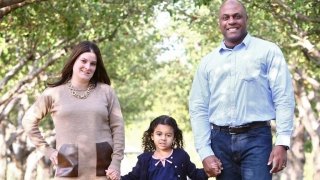Bringing Demi Home
My Blythedale Experience

Our daughter Demi was diagnosed with Juvenile Pilocytic Astrocytoma, a rare brain tumor found in children. Once diagnosed in the ER, Demi had to undergo an emergency surgery to have a ventricular drain placed into her skull in order to drain the excess cerebrospinal fluid that accumulated due to the size of the tumor. The very next day, Demi endured an 8 hour craniotomy to remove the tumor. Right after surgery, Demi coughed out her breathing tube and immediately asked for water. She seemed to be doing very well after going through such an intense surgery. One day later we were hit with another tribulation, our daughter has posterior fossa syndrome which was an immediate result of her brain surgery, again very rare. Our doctor told us this only happens to around 10% or less of cases. This left her paralyzed, mute, unable to walk, and couldn’t swallow to eat food or liquids properly. She ended up having to get a feeding tube in so she could get her proper nutrition and take any medications. We were not at all informed or prepared for this, so it was a complete surprise to us when our daughter lay there in the hospital bed like a ragdoll. Demi had no facial expressions; she couldn’t even smile or frown. Demi had to relearn how to do all of these basic tasks all over again. It was unimaginable that all the things our daughter once did were so easily gone with a blink of an eye. For a while, we were waiting for the day Demi would just smile at us much less utter a word. The doctors did not know much about this syndrome so they could not tell us when she could recover from this. They said it could be months to years and could not promise us if everything would return fully or just partially.
After a couple of weeks in the hospital, we admitted Demi into an inpatient rehabilitation center, Blythedale Children’s Hospital in Vallhalla, NY. There was an impatient rehab 15 minutes from our home, but we did some research and found that Blythedale Children’s hospital had a specialized Traumatic Brain Injury Unit and they catered to children. We made a decision to pick up, close up our home for 30-60 days and go to this specialty hospital about two hours from our home and businesses.
As soon as we arrived at Blythedale in the ambulance and set foot through the front doors, we saw Demi’s face go from stressed as it was at the previous hospital to an expression of relief. She seemed so happy to be there. It was such a bright environment and didn’t seem anything like a hospital environment we had just left. The first day we arrived at Blythdale, almost as soon as we checked in, Mara Abrams, her Physical Therapist, came in and got right down to business. She ordered a wheelchair for Demi right away so she could immediately get out of bed and sit upright. The very first day at Blythedale, we were able to get Demi got out of bed and sit her up in a chair. This was a big step in Demi’s recovery. Prior to admission to Blythdale, Demi was bedridden. At the hospital, we had to be sure to turn her every few hours so she wouldn’t develop bed sores since she was unable to get out of bed or move.
At Blythedale, Demi had a very rigorous schedule of Physical Therapy, Occupational Therapy & Speech; five days per week, three to four hours per day of hard work. All of the therapists were committed to helping our daughter improve as fast as possible. They were very understanding of our daughter’s needs and knew just how far she can be pushed to get the most out of every therapy; even though we as parents were scared and had no idea what Demi was capable of at those moments. We trusted the therapists’ expertise every step of the way even though it was scary for us, and are glad we did so. They all knew we all wanted to be home and back to a regular routine asap.
For 30 days, Blythdale was our family’s home. After almost 30 days of being at Blythedale, we got a really good understanding of Demi’s recovery and what it consisted of. We were told when we were first admitted that Demi would most likely have to be there for a minimum of 60 days. We felt it may help Demi’s recovery along more rapidly if she was home around her own surroundings. The team at Blythedale were completely supportive with our decision to take our daughter home and continue the same frequency of therapies. Demi was discharged from Blythedale with orthotics because she could not walk without them. The first week we were home, Demi did not need orthotics anymore. By the time we were getting ready to be discharged from Blythedale, our daughter was speaking a few words and eating on her own without a feeding tube. Thirty days after leaving Blythedale, Demi was able to walk unassisted. One year later, we have a happy ending to our daughter’s story. We have our energetic and determined, sweet daughter back. We thank Blythedale for being a part of our daughter’s amazing story.
In summary, Blythedale Children’s Hospital was the best decision we could have made for our daughter. We knew we only had one chance at giving her the best recovery possible so she could be the energetic three-year old we once knew. Blythedale made that difference and we cannot thank them enough. It was the best experience we could have in the situation we were all put in.
-Sara and Dwayne Robinson



